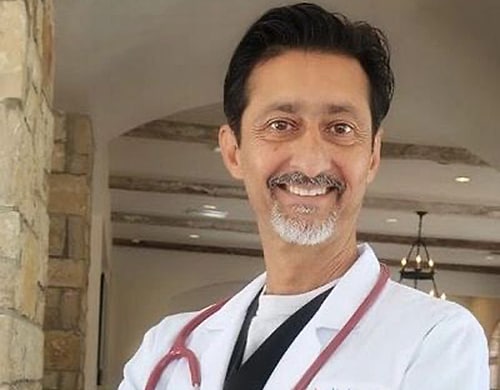The United States has a growing health problem. On account of poor diet choices, particularly those toward highly processed foods, the majority of American adults are overweight or obese, with record numbers of cardiovascular disease and other health ailments as well.
Rizwan Bukhari, MD, and Maya Acosta, a husband-and-wife duo in Dallas, Texas, are seeking to change that. In 2016, the pair founded Plant -Based DFW, a nonprofit organization that seeks to shift the paradigm surrounding food and help people make more informed choices about their dietary decisions.
Bukhari graduated from Johns Hopkins University in 1987 before attending medical school at the University of Texas Southwestern. He completed a 5-year general residency in Dallas and a 2-year fellowship in vascular surgery in Cincinnati, Ohio. It was during this journey that he began to discover the health consequences of the typical American diet that still exist today. According to the Centers for Disease Control and Prevention, 73.6% of Americans are overweight, while about 13% suffer from diabetes.
“I became interested in plant-based nutrition as a way to prevent the diseases that I treat,” Bukhari said. “As a vascular surgeon, I do a lot of things like bypass operations. I clean out arteries. We see the ravages that the disease I treat does to people.”

Rizwan Bukhari, a vascular surgeon and co-founder of Plant-Based DFW
He did not come to the conclusion that our diets can negatively affect our health by himself. Early in his medical journey he met Acosta. Prior to becoming a community advocate of a plant-based diet, Acosta was a teacher in the Dallas–Fort Worth (DFW) Metroplex when she stumbled on the benefits of cutting out meats and processed foods. “My interest led me to some great books to learn about great people in the community that are movers and shakers who really want to help people,” she said. “And I began to study the benefits of plant nutrition on my own.”
During their courtship, Bukhari noticed that Acosta was ahead of the curve in terms of caring for her metabolic health, inspiring him to take a deeper look into the effects of a plant-based diet on cardiovascular health. He was already a self-described “ethical vegan” in that he opposed eating animal products on a moral basis, but wanted to dive deeper into the health benefits of the dietary choice.
“Maya had already been on a journey towards plant-based nutrition when we met, and she didn’t eat much meat,” he said. Acosta’s inspiration to strive toward a plant-based diet only increased after marrying Bukhari, ultimately culminating in the creation of Plant Based DFW.

Maya Acosta was a herald for plant-based nutrition long before it became trendy.
Acosta enrolled in a plant-based nutrition certification course from Cornell University, and that served as her motivation for becoming actively involved in the plant-based community. Following suit, Bukhari achieved certification in lifestyle medicine by the American Board of Lifestyle Medicine in 2019 and later completed the same plant-based nutrition course at Cornell.
Empowering People Through Healthier Choices
Founded in 2016, Plant-Based DFW exists as a community that works to increase accessibility to plant-based options and distribute knowledge about the diet. Whether through lectures, collecting and disseminating information, or formulating meal plans, Plant-Based DFW seeks to be a starting point for those new to plant-based nutrition and a stepping stone for those already committed to the lifestyle.
“Our goal is to be a resource to help empower other people so that they can take control of their health,” said Acosta. “We started to expand our efforts to talk about the other components of health, like using exercise as medicine, managing stress, and building healthy relationships.”
Plant-Based DFW outreach efforts also include Acosta’s cooking show, featured on the team’s website. Using her own kitchen, she walks through detailed meal prep strategies using familiar ingredients as well as often ignored foods in American diets, such as lentils, brown rice, and Brussels sprouts. The pair also lend their knowledge to a podcast hosted by PlantPure Communities, a nationwide organization that aims to spread the message about the importance of tackling health with exercise and plant-based eating.

Together, Acosta and Bukhari help foster a health-conscious lifestyle in their community.
Bukhari also hosts a monthly Walk With a Doc program in their Dallas community, where he speaks on his experience living a plant-based life while on a neighborhood stroll with patients who are hoping to lead a more health-conscious lifestyle. Through a variety of methods, Acosta and Bukhari are building a community of like-minded people to foster a sense of belonging.
Despite the intricate level of outreach, however, the core foundation of Plant-Based DFW remains the same: a diet that contains the regular consumption of animal products such as meats, dairy, and eggs may not be the best option for us. But nutritional experts disagree as to the source of America’s diet-based ills, most notably emphasizing that simply eating meat every day is not a singularly unhealthy practice.
Eat Your Vegetables — With a Grain of Salt
Diana Figueroa, RD, a licenced dietician in the Dallas–Fort Worth area, disagrees with the notion that eating meat or other animal products is a source of nutritional sabotage. In advising her clients, the last thing she recommends as a standard practice is a diet that partially or wholly restricts foods of any kind.
“I’m not going to take meat from someone’s diet away because, in many cases, it’s absolutely necessary,” she said. “Humans have been eating meat for millennia. I’ve had people have complete success with eating a balanced diet containing meat.”
People who switch to a plant-based diet, as advised by Bukhari and Acosta, can lose weight in a healthy way and increase their metabolic health, reducing the risk of cardiovascular disease and diabetes. An increase in overall health and decreased weight are not due solely to removing meat from their diet but rather from scaling back the standard American diet, which contains multiple servings of meat per day, which is incredibly calorie-dense.
Where dietary experts like Figueroa and plant-based advocates agree is in the lack of nutritional value in highly processed foods. Manufactured with oils and preservatives for an enhanced shelf life, most processed foods remove vital micronutrients and fibers in favor of portability and flavor.
“We say eat the potato, not the potato chip,” Burkhari adds. “That can still taste really good without all of that processing and oils. Your food can still be flavorful.”
Plant-Based DFW hopes to make meaningful change in large and small ways. “What I often say to people is that I’m not in the business of trying to convince anyone. I’m in the business of supporting people who are ready to make a change,” Acosta said.
Plant-Based DFW, she emphasized, is not a cult or a singularity when it comes to its mission. Most notably, the website for Plant-Based DFW contains little research or testimony but rather a collection of links, videos, and how-tos when it comes to making positive nutritional changes.
“In a nutshell, we want to be a resource,” Burkhari said. “We want to build and better our community.”
For more news, follow Medscape on Facebook, Twitter, Instagram, and YouTube.
Source: Read Full Article
